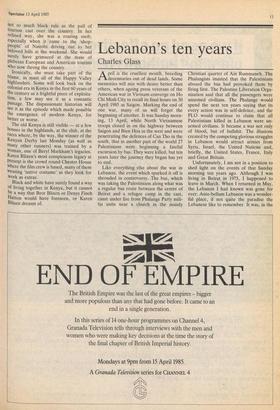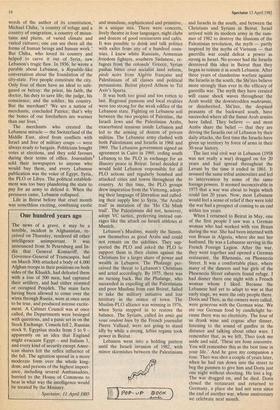Lebanon's ten years
Charles Glass
April is the cruellest month, breeding decennaries out of dead lands. Some memories will mix with desire better than others, when ageing press veterans of the American war in Vietnam converge on Ho Chi Minh City to recall its final hours on 30 April 1985 as Saigon. Marking the end of one war, many of us will forget the beginning of another. It was Sunday morn- ing, 13 April, while North Vietnamese troops closed in on the highway between Saigon and Bien Hoa in the west and were penetrating the defences of Can Tho in the south, that in another part of the world 27 Palestinians were beginning a fateful excursion by bus. They were killed, but ten years later the journey they began has yet to end.
Like everything else about the war in Lebanon, the event which sparked it off is shrouded in controversy. The bus, which was taking the Palestinians along what was a regular bus route between the centre of Beirut and a refugee camp in the east, came under fire from Phalange Party mili- tia units near a church in the mainly Christian quarter of Ain Rummaneh. The Phalangists insisted that the Palestinians aboard the bus had provoked them by firing first. The Palestine Liberation Orga- nisation said that all the passengers were unarmed civilians. The Phalange would spend the next ten years saying that its every action was in self-defence, and the PLO would continue to claim that all Palestinians killed in Lebanon were un- armed civilians. It became a war not only of blood, but of bullshit. The illusions created by the competing glorious struggles in Lebanon would attract armies from Syria, Israel, the United Nations and, briefly, the United States, France, Italy and Great Britain.
Unfortunately, I am not in a position to shed light on the events of that Sunday morning ten years ago. Although I was living in Beirut in 1975, I happened to leave in March. When I returned in May, the Lebanon I had known was gone for ever. Ante-bellum Lebanon was a wonder- ful place, if not quite the paradise the Lebanese like to remember. It was, in the
words of the author of its constitution, • Michael Chiha, 'a country of refuge and a country of emigration, a country of moun- tains and plains, of varied climate and varied cultures; one can see there all the forms of human beings and human work.' But Chiha, who loved its country and helped to carve it out of Syria, saw Lebanon's tragic flaw. In 1936, he wrote a parable about Lebanon, a Republic-like conversation about the foundation of the city-state. Five people constitute the city. Only four of them have an ideal to safe- guard or betray: the priest, his faith; the doctor, his duty to save life; the judge, his conscience; and the soldier, his country. But the merchant? 'We are a nation of merchants, concluded Patrice; that's why the bones of our forefathers are warmer than our lives.'
The merchants who created the Lebanese miracle — the Switzerland of the Middle East, aloof from conflicts with Israel and free of military coups — were always ready to bargain. Politicians bought votes at elections, and they sold favours during their terms of office. Journalists sold their newspapers to anyone who would buy them, and every Lebanese publication was the voice of Egypt, Syria, the PLO or Libya. The political establish- ment was too busy plundering the state to pay for an army to defend it. When the pressures came, Lebanon collapsed.
Life in Beirut before that cruel month was nonethless exciting, combining exotic
and mundane, sophisticated and primitive, in a unique mix. There were concerts, lively theatre in four languages, night clubs and dozens of good restaurants and cafés. It was possible to drink and talk politics with exiles from any of a hundred coun- tries. I knew white Russians, Armenian freedom fighters, southern Sudanese, re- fugees from the colonels' Greece, Syrian pashas bitter over socialist land reform, pieds noirs from Algerie francaise and Palestinians of all classes and political persuasions. Beirut played Athens to Tel Aviv's Sparta.
It was both too good and too rotten to last. Regional passions and local rivalries were too strong for the weak edifice of the Lebanese state. Fighting on Lebanese soil between the two peoples of Palestine, the Israeli Jews and the Palestinian Arabs, exacerbated tensions inside Lebanon and led to the arming of dozens of private militias. The Lebanese army clashed with both Palestinians and Israelis in 1968 and 1969. The Lebanese government signed an agreement in Cairo in 1969, ceding south Lebanon to the PLO in exchange for an illusory peace in Beirut. Israel decided it would hold Lebanon responsible for all PLO actions and regularly bombed and attacked cities and towns throughout the country. At this time, the PLO groups drew inspiration from the Vietcong, adopt- ing their language of liberation and called- ing their supply line to Syria, 'the Arafat trail' in imitation of the 'Ho Chi Minh trail'. The Palestinians did not, however, adopt VC tactics, preferring instead out- rages like the attack on Israeli athletes at Munich.
Lebanon's Muslims, mainly the Sunnis, saw themselves as good Arabs and could not remain on the sidelines. They sup- ported the PLO and asked the PLO to support them in their claims against the Christians for a larger share of power and wealth in Lebanon. The Phalange per- ceived the threat to Lebanon's Christians and acted accordingly. By 1975, there was no turning back. But the Phalange, who succeeded in expelling all the Palestinians and poor Muslims from east Beirut, failed to take the military initiative and lost territory in the centre of town. The Muslim-PLO alliance was winning in 1976,
when Syria stepped in to restore the balance. The Syrians, called les amis qui VO14S veulent bien by the French journalist Pierre Vallaud, were not going to stand idly by while a strong, leftist regime took power in Beirut.
Lebanon went into a holding pattern until the Israeli invasion of 1982, with minor skirmishes between the Palestinians and Israelis in the south, and between the Christians and Syrians in Beirut. Israel arrived with its modern army in the sum- mer of 1982 to destroy the illusions of the Palestinian revolution, the myth — partly inspired by the myths of Vietnam — that guerrilla war could defeat a power as strong as Israel. No sooner had the Israelis destroyed this idea in Beirut than they began to restore it in south Lebanon. After three years of clandestine warfare against the Israelis in the south, the Shi'ites believe more strongly than ever in the efficacy of guerrilla war. The myth they have created
will cause shock waves throughout the Arab world: the downtrodden muhramin, or disinherited, Shi'ites, the despised peasants of the backward south, have succeeded where all the Sunni Arab armies have failed. They believe — and most Arabs share the belief — that they are driving the Israelis out of Lebanon by their daily attacks, the first time the Israelis have given up territory by force of arms in their 30-year history.
The last real civil war in Lebanon (1958 was not really a war) dragged on for 20 years and had spread throughout the Levant by the time it ended in 1861. It aroused the same tribal animosities and led to intervention by some of the same foreign powers. It seemed inconceivable in 1975 that a war was about to begin which could last 20 years. Now, most Lebanese would feel a sense of relief if they were told the war had a prospect of coming to an end within ten years.
When I returned to Beirut in May, one of the first people I saw was a German woman who had worked with von Braun during the war. She had been interned with von Braun in Algeria, where she met her husband. He was a Lebanese serving in the French Foreign Legion. After the war, they went together and opened a German restaurant, the Rhenania, on Phoenecia Street. It was a comfortable place, where many of the dancers and bar girls of the Phoenecia Street cabarets found refuge. I had dinner there one night with a French woman whom I liked. Because the Lebanese had yet to adapt to war at that early stage, we were the only people there. Doris and Theo, as the owners were called, were generous with the German wine. We ate our German food by candlelight be- cause there was no electricity. The four of us drank wine and cognac after dinner, listening to the sound of gunfire in the distance and talking about other wars. I remember that, as we left, Theo took me
aside and said, 'These are bons souvenirs. You will remember this as the best time in
your life.' And he gave my companion a rose. Theo was shot a couple of years later, when he had run down into the street to beg the gunmen to give him and Doris just one night without shooting. He lost a leg. The war dragged on, and he died. Doris closed the restaurant and returned to Germany, a place she had not seen since the end of another war, whose anniversary we celebrate next month.















































 Previous page
Previous page